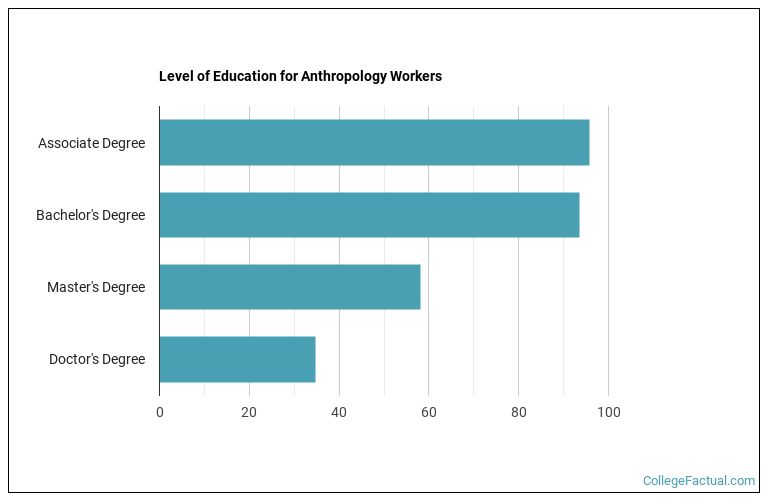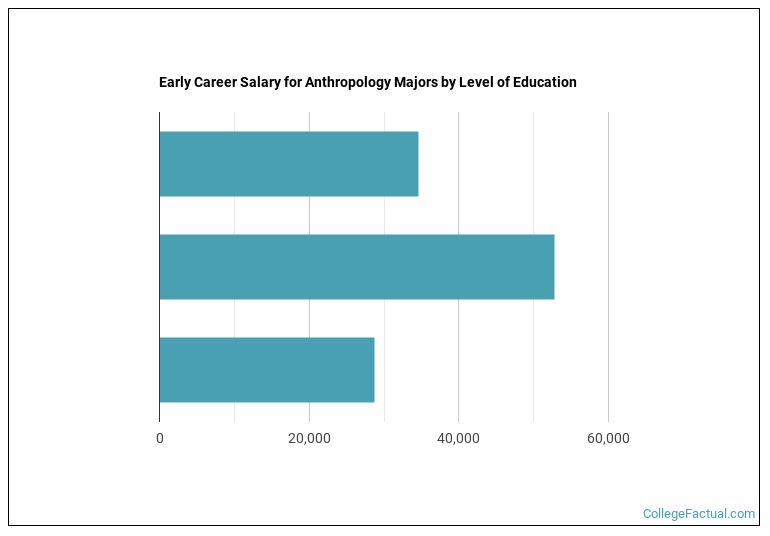 by our College Data Analytics Team
by our College Data Analytics TeamAnthropology is the study of humankind throughout history all around the world. Some of the subjects you will discuss in your classes are similarities and differences between people groups, how different groups live with each other, culture creation, and how human beings evolve and adapt.
Anthropology requires looking at things from new perspectives. You will be exploring how past cultures lived, ate, raised families and created meaning in life. Some courses you can expect to encounter are biological anthropology, human biology, human origins, introduction to anthropology, principles of archaeology, language, and modern human physical variation.
Some of the concentrations available in this major are Physical and Biological Anthropology, Medical Anthropology, or Cultural Anthropology.
In 2021-2022, anthropology was the 77th most popular major nationwide with 11,105 degrees awarded. This year's Best Anthropology Schools ranking compares 265 of them to identify the best overall programs in the country. Continue reading to check out one of our many unbiased rankings of anthropology programs later in this article.
Students should have both a scientific inquisitive mind, as well as an interest in people. Develop strong written and oral communication skills in order to write clear papers and present your findings in presentations. Writing and speech should be done in a clear concise manner so that any person can understand the data.
Part of your studies will involve exploring and learning about different cultures, people, and places. An open mind will allow you to objectively compare and contrast various lifestyles and ideas. Critical thinking skills and reasoning will help you piece together historical facts as well as analyze data from research.
New students will need to have completed high school or a GED program and each school will have their own minimum GPA and SAT/ACT test requirements. Once you obtain your degree, additional anthropology certifications required to pursue a career in this field.
Anthropology degree levels vary. You can get anything from a in anthropology to the highest anthropology degree, a . Depending on the anthropology degree you choose, obtaining your diploma can take anwhere from 1 to 4+ years.
| Degree | Credit Requirements | Typical Program Length |
|---|---|---|
| Associate Degree | 60-70 credits | 2 years |
| Bachelor’s Degree | 120 credits | 4 years |
| Master’s Degree | 50-70 credits | 1-3 years |
| Doctorate | Program required coursework including thesis or dissertation | At least 4 years |
A bachelor's degree is the most common level of education achieved by those in careers related to anthropology, with approximately 35.5% of workers getting one. People currently working in careers related to anthropology tend obtained the following education levels.
| Level of Education | Percentage of Workers |
|---|---|
| Doctoral Degree | 34.8% |
| Bachelor’s Degree | 34.3% |
| Master’s Degree | 20.9% |
| Post-Doctoral Training | 2.8% |
| Associate’s Degree (or other 2-year degree) | 2.1% |
58.1% of anthropology workers have at least a master's. View the chart below to get an idea of what degree level most of those in anthropology careers have.

This of course varies depending on which anthropology career you choose.
In order to become an anthropologist you must obtain your Ph.D. Although the employment field of anthropology is predicted to grow, it is a small and competitive field to get into. Anthropologists use their advanced knowledge to research current issues, human life, culture, and history. They are found teaching college classes or working for the government or corporations doing research.
Graduates who do not wish to pursue an advanced degree may find work in a variety of places. Anthropology majors have critical thinking and reasoning skills that make them attractive to many employers. They could find work in human services, sales, business administration, marketing and other fields of interest.
Want a job when you graduate with your anthropology degree? Anthropology careers are expected to grow 8.0% between 2016 and 2026.
The following options are some of the most in-demand careers related to anthropology.
| Occupation Name | Projected Jobs | Expected Growth |
|---|---|---|
| Managers | 1,071,700 | 8.0% |
| Anthropologists and Archeologists | 7,900 | 3.9% |
| Anthropology and Archeology Professors | 7,800 | 9.9% |
Recently graduated anthropology students earned an average of $28,900 in <nil>. Earnings can range from as low as $12,059 to as high as $68,648. As you might expect, salaries for anthropology graduates vary depending on the level of education that was acquired.

Salaries for anthropology graduates can vary widely by the occupation you choose as well. The following table shows the top highest paying careers anthropology grads often go into.
| Occupation Name | Median Average Salary |
|---|---|
| Managers | $115,590 |
| Anthropology and Archeology Professors | $94,080 |
| Anthropologists and Archeologists | $65,310 |
With over 1,218 different anthropology degree programs to choose from, finding the best fit for you can be a challenge. Fortunately you have come to the right place. We have analyzed all of these schools to come up with hundreds of unbiased anthropology school rankings to help you with this.
Anthropology is one of 13 different types of Social Sciences programs to choose from.
| Major | Annual Graduates |
|---|---|
| Anthropology | 10,607 |
| Medical Anthropology | 226 |
| Other Anthropology | 117 |
| Cultural Anthropology | 66 |
| Physical & Biological Anthropology | 53 |
| Related Major | Annual Graduates |
|---|---|
| Economics | 47,809 |
| Political Science & Government | 47,686 |
| Sociology | 35,816 |
| General Social Sciences | 17,338 |
| International Relations & National Security | 13,958 |